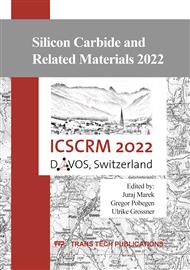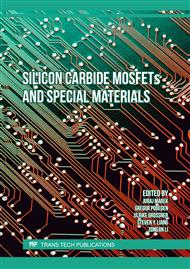[1]
S. J. Brugler and P. G. A. Jespers, "Charge Pumping in MOS Devices", IEEE Trans. Electron Devices, vol. 16, no. 3, p.297–302, 1969.
DOI: 10.1109/t-ed.1969.16744
Google Scholar
[2]
G. Groeseneken, H. E. Maes, N. Beltran, and R. F. De Keersmaecker, "A Reliable Approach to Charge-Pumping Measurements in MOS Transistors", IEEE Trans. Electron Devices, vol. 31, no. 1, p.42–53, 1984.
DOI: 10.1109/t-ed.1984.21472
Google Scholar
[3]
G. V. Groeseneken, I. De Wolf, R. Bellens, and H. E. Maes, "Observation of single interface traps in submicron MOSFET's by charge pumping", IEEE Trans. Electron Devices, vol. 43, no. 6, p.940–945, 1996.
DOI: 10.1109/16.502127
Google Scholar
[4]
G. Van den bosch, P. Heremans, G. V. Groeseneken, and H. E. Maes, "Spectroscopic Charge Pumping: A New Procedure for Measuring Interface Trap Distributions on MOS Transistors," IEEE Trans. Electron Devices, vol. 38, no. 8, p.1820–1831, 1991.
DOI: 10.1109/16.119021
Google Scholar
[5]
G. Kaden and H. Reimer, "Ladungstragereinfang in MOS-Strukturen mit externer Minoritatstragerquelle," Phys. Stat. Sol., vol. 32, p.183–194, 1975.
DOI: 10.1002/pssa.2210320120
Google Scholar
[6]
T. E. Rudenko, I. N. Osiyuk, I. P. Tyagulski, H. Ö. Ólafsson, and E. Ö. Sveinbjörnsson, "Interface trap properties of thermally oxidized n-type 4H-SiC and 6H-SiC," Solid. State. Electron., vol. 49, no. 4, p.545–553, 2005.
DOI: 10.1016/j.sse.2004.12.006
Google Scholar
[7]
F. Allerstam, H. Ö. Ólafsson, G. Gudjónsson, D. Dochev, and E. Ö. Sveinbjörnsson, "A strong reduction in the density of near-interface traps at the SiO2 / 4H-SiC interface by sodium enhanced oxidation," J. Appl. Phys., vol. 101, no. 124502, p.1–5, 2007.
DOI: 10.1063/1.2745321
Google Scholar
[8]
G. Van den bosch, G. Groeseneken, and H. E. Maes, "On the Geometric Component of Charge-Pumping Current in MOSFET's," IEEE Electron Device Lett., vol. 14, no. 3, p.107–109, 1993.
DOI: 10.1109/55.215126
Google Scholar
[9]
D. Okamoto, H. Yano, T. Hatayama, Y. Uraoka, and T. Fuyuki, "Criteria for accurate measurement of charge-pumping current in 4H-SiC MOSFETs," Mater. Sci. Forum, vol. 600–603, p.747–750, 2009.
DOI: 10.4028/www.scientific.net/msf.600-603.747
Google Scholar
[10]
H. Yoshioka, T. Nakamura, and T. Kimoto, "Generation of very fast states by nitridation of the SiO2/SiC interface," J. Appl. Phys., vol. 112, no. 024520, p.1–7, 2012.
DOI: 10.1063/1.4740068
Google Scholar
[11]
J. B. Kuo, R. W. Dutton, and B. A. Wooley, "MOS Pass Transistor Turn-Off Transient Analysis," IEEE Trans. Electron Devices, vol. 33, no. 10, p.1545–1555, 1986.
DOI: 10.1109/t-ed.1986.22706
Google Scholar
[12]
J. G. J. Chern, P. Chang, R. F. Motta, and N. Godinho, "A New Method To Determine MOSFET Channel Length," IEEE Electron Device Lett., vol. 1, no. 9, p.170–173, 1980.
DOI: 10.1109/edl.1980.25276
Google Scholar
[13]
E. Pippel, J. Woltersdorf, H. Ö. Ólafsson, and E. Ö. Sveinbjörnsson, "Interfaces between 4H-SIC and SiO2: Microstructure, nanochemistry, and near-interface traps," J. Appl. Phys., vol. 97, no. 3, p.1–8, 2005.
DOI: 10.1063/1.1836004
Google Scholar



